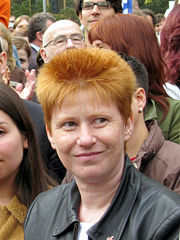
Petra Pau
Encyclopedia

The Left (Germany)
The Left , also commonly referred to as the Left Party , is a democratic socialist political party in Germany. The Left is the most left-wing party of the five represented in the Bundestag....
in the German
Germany
Germany , officially the Federal Republic of Germany , is a federal parliamentary republic in Europe. The country consists of 16 states while the capital and largest city is Berlin. Germany covers an area of 357,021 km2 and has a largely temperate seasonal climate...
parliament, the Bundestag
Bundestag
The Bundestag is a federal legislative body in Germany. In practice Germany is governed by a bicameral legislature, of which the Bundestag serves as the lower house and the Bundesrat the upper house. The Bundestag is established by the German Basic Law of 1949, as the successor to the earlier...
. First elected in 1998, from 2002 - 2005 she was one of just two party representatives, having been directly elected as the representative of Berlin Marzahn – Hellersdorf
Berlin Marzahn – Hellersdorf (electoral district)
thumb|right|250px|Location of constituency in BerlinBerlin Marzahn – Hellersdorf is one of the 299 single member constituencies used for the German parliament, the Bundestag...
, a working-class area of east Berlin
Berlin
Berlin is the capital city of Germany and is one of the 16 states of Germany. With a population of 3.45 million people, Berlin is Germany's largest city. It is the second most populous city proper and the seventh most populous urban area in the European Union...
. She is currently one of the vice presidents of the Bundestag and belongs to the reform-oriented members of her party, actively supporting parliamentary representative democracy.
Political career
Pau's first involvement in politics came in 1983 when she joined the Socialist Unity PartySocialist Unity Party of Germany
The Socialist Unity Party of Germany was the governing party of the German Democratic Republic from its formation on 7 October 1949 until the elections of March 1990. The SED was a communist political party with a Marxist-Leninist ideology...
(SED), the governing party of the former East Germany. After German reunification, the SED became the Party of Democratic Socialism (PDS) and she was elected as a PDS member to the Borough Assembly of Hellersdorf
Hellersdorf
Hellersdorf is a locality in the borough of Marzahn-Hellersdorf in Berlin. Between 1986 and Berlin's 2001 administrative reform, it was a borough in its own right, consisting of the current area of Hellersdorf as well as Kaulsdorf and Mahlsdorf.-History:...
in Eastern Berlin in October 1990. She became district Chairwoman of the PDS branch in Hellersdorf in October 1991 and was elected Chairwoman of the PDS in Berlin in October 1992, serving as national Deputy Chairwoman from 2000 until 2002.
She was elected to the Berlin parliament in 1995 and remained a member until 1998 when she was elected to the Bundestag for the Berlin Mitte - Prenzlauer Berg constituency. Controversial boundary changes abolished this constituency and for the 2002 election, she moved to Marzahn-Hellersdorf, regarded as a safe seat for the PDS. She was elected for that constituency in 2002 and re-elected at the subsequent elections in 2005 and 2009.
She used to be a leader of the East German pioneer
Ernst Thälmann Pioneer Organisation
The Ernst Thälmann Pioneer Organisation, consisting of the Young Pioneers and the Thälmann Pioneers, was a youth organisation of schoolchildren aged 6 to 14, in East Germany...
s and an art teacher.
Literature
- Michael F. FeldkampMichael F. FeldkampMichael F. Feldkamp, is a German historian and journalist.-Career:Feldkamp was born in Kiel. After completing his high school studies at the Gymnasium Carolinum in Osnabrück, he studied history, Catholic theology, teaching, and philosophy at the Rhineland Friedrich-Wilhelms University in Bonn...
(ed.), Der BundestagspräsidentPresident of the BundestagThe President of the Bundestag presides over the sessions of the Bundestag, the parliament of Germany, with functions similar to that of a speaker in other countries. In the German order of precedence, his office is ranked second after the President and before the Chancellor...
. Amt - Funktion - Person. 16. Wahlperiode, München 2007, ISBN 978-3-7892-8201-0

